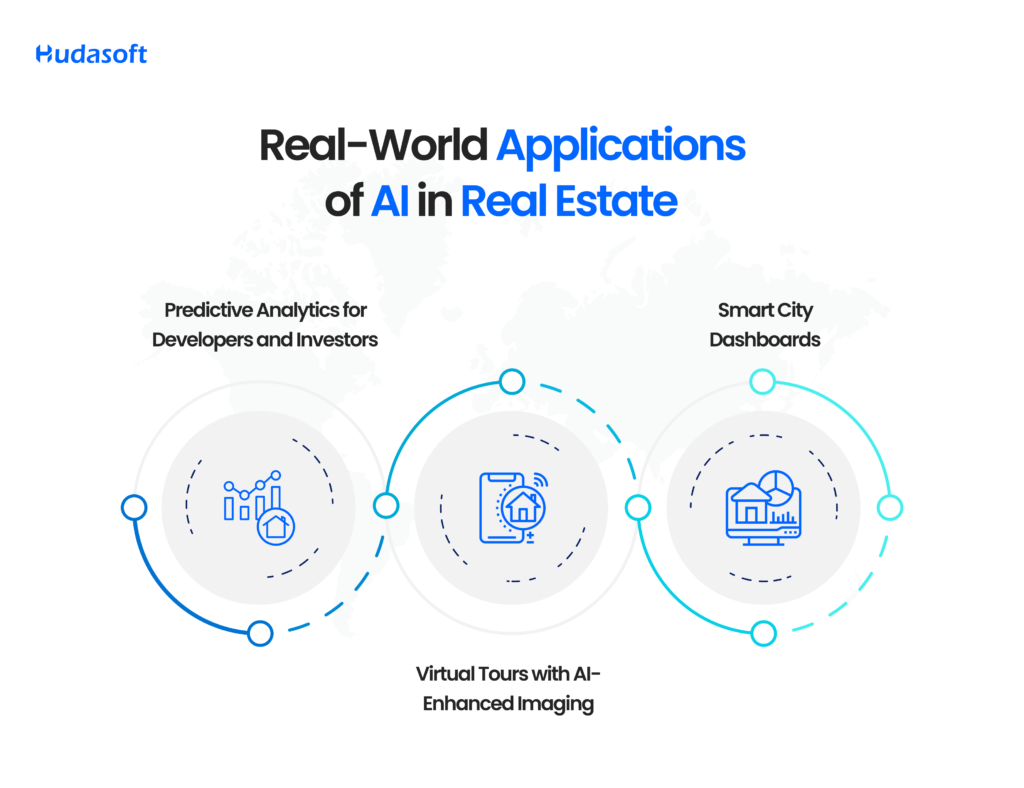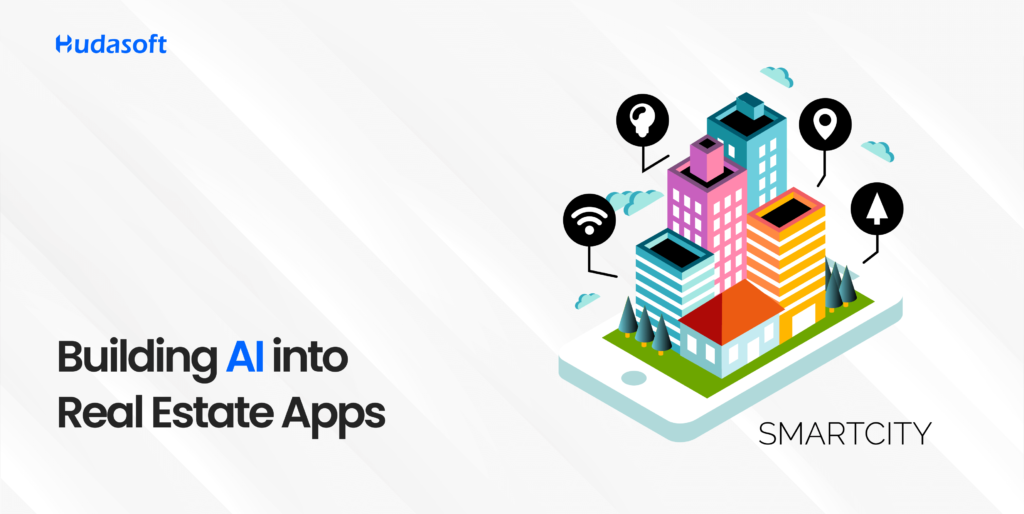Table of Contents
Real estate has long been perceived as a slow-moving, labour-intensive industry driven by manual site visits, paperwork, and human intuition. In the era of digital transformation, however, Artificial Intelligence (AI) is fundamentally changing the landscape.
Today, AI enhances everything from property searches assisted by computer vision to predictive analytics for investment decisions. Meanwhile, intelligent real estate apps are becoming essential tools for property businesses seeking speed, accuracy, and scalability.
In this post, we explore how AI and real estate intersect across multiple dimensions, highlighting strategic benefits for investors, agents, and developers, and examining the core components of automated real estate investing systems.
The Growing Role of AI in Real Estate
The adoption of AI in real estate is accelerating rapidly. The global AI in real estate market was valued at $222.6 billion in 2024 and is projected to reach $303.1 billion in 2025, a 36.1 percent year-over-year increase. Over a longer horizon, some projections place market size close to $989 billion by 2029, with an average annual growth of 34.4 percent.
Major drivers include:
- Automated Valuation Models (AVMs) enabling instant property appraisals
- Natural-language chatbots for property search and customer engagement
- Predictive analytics guiding smarter investments and asset management
- AI-powered automation of leases, contracts, and listing processes
- Computer-vision systems enabling virtual tours and enhanced listing previews
AI is not a futuristic concept, it is actively reshaping the real estate ecosystem.
How Real Estate Businesses Benefit from AI

| Problem | AI Solution | Measurable Impact |
| Inaccurate valuations | AI-powered AVMs | Reduced error margins to under 5%, valuations in seconds |
| Poor lead quality | AI lead scoring and segmentation | Improved conversion rates and 30–40 percent drop in wasted follow-ups |
| Slow document processing | Natural-language processing for lease and contract analysis | Auto-extraction accuracy up to 90 percent; saves hours per file |
| Manual listing creation | Auto-populate MLS listings via image/document AI | Reduces data entry time by 5–10 minutes per listing |
1. AVMs for Precision Valuation
Traditional appraisals can require days and are subject to bias. AI-based AVMs use property history, neighbourhood data, and even satellite images to produce highly accurate valuations within minutes, typically within 3–5 percent of actual market values.
2. Lead Scoring and Segmentation
AI analyses buyer signals such as listing views and chat interactions to rank leads by intent. Firms using this technology report 30-40 percent fewer low-potential follow-ups and improved response efficiency.
3. Document Automation via NLP
AI tools with natural-language processing capabilities extract key lease terms, deadlines, and financial obligations with 80–90 percent accuracy, significantly reducing manual review time and risk of error.
4. Listing Auto-Fill
AI systems process listing documents and images to recommend features and auto-populate listings. This saves agents several minutes per entry and improves listing consistency and speed.
Real-World Applications of AI in Real Estate

Here is a deep dive into a high-impact use case:
1. Predictive Analytics for Developers and Investors
AI models integrate historical sales, demographics, infrastructure data, and economic indicators to identify promising investment opportunities. Automated alert systems notify users when a property meets specific ROI criteria.
According to McKinsey, commercial real estate companies leveraging AI garnered more than a 10 percent increase in net operating income via smarter retention and asset strategies. Another study by Knight Frank estimated that implementing predictive maintenance alone can reduce repair costs by 25 to 30 percent and cut downtime in half.
2. Virtual Tours with AI-Enhanced Imaging
AI-enhanced virtual tours now include dynamic features like virtual staging, background clean-up, and interactive furniture placement. These tours deliver a 20 to 30 percent increase in buyer engagement and lead qualification rates.
3. Smart City Dashboards
Developers and investors now use real-time, city-level dashboards powered by AI that integrate data on foot traffic, vacancy trends, permitting, and infrastructure changes. These dashboards support data-driven planning and optimization at scale.
Building AI into Real Estate Apps

To create an effective AI real estate system, key modules include intelligent search, predictive pricing, document automation, virtual assistants, and investment dashboards.
With expert real estate app development services, these features can be tailored to your business needs—driving smarter, data-backed decisions.
1. Natural-Language Property Search
Offer intuitive search filters like “three-bedroom condos under $500k near top-rated schools.”
2. Predictive Lead Insights
Automatically rank leads by conversion probability, helping agents prioritize high-value prospects.
3. Real-Time Market Heatmaps
Display overlays of rent trends, days-on-market statistics, and investor interest to guide pricing and strategy.
4. Intelligent CRM Integration
Sync lead data, generate follow-up tasks, and trigger reminders based on AI insights.
5. Automated Notifications and Workflow Triggers
Automate alerts such as “Price dropped 5 percent” or “Lead inactive for 48 hours” to maintain client engagement and efficiency.
Together, these features establish a seamless AI-driven platform that automates repetitive tasks and delivers strategic insights.
Final Words
Hudasoft AI is fundamentally transforming every stage of the real estate lifecycle, from valuation and client engagement to prediction and property management. As adoption increases, real estate professionals will benefit from:
- Faster, more accurate automated valuations
- Smarter lead processes and higher conversion rates
- Significant time savings on document and listing tasks
- Enhanced investment decision-making based on data and forecasting
- Elevated client experiences powered by virtual tours and intelligent interactions
For brokers, investors, and developers, adopting or building an AI-powered real estate app is no longer optional—it is critical to remain relevant and competitive in a fast-evolving market.
Frequently Asked Questions
How is AI used in real estate today?
AI supports tasks like instant valuations through AVMs, lead scoring, lease document analysis, virtual home staging, chat-based customer support, and predictive analytics for property performance.
What are the top AI features in real estate apps?
Key features include natural-language search, predictive lead scoring, AI-powered virtual tours, market heatmaps, chatbot assistance, and automated workflow triggers.
Can AI help in finding better property deals?
Yes, AI platforms can screen thousands of properties daily for ROI, rental yield, and market trends and alert investors to high-potential opportunities.
What is the cost of building an AI-powered real estate app?
Basic search and chatbot features start around $50,000 to $100,000. Advanced apps with AVMs, predictive analytics, and full CRM integration can range from $150,000 to $500,000 or more.
Is AI safe for client data in real estate?
Yes, when platforms adhere to data privacy frameworks like GDPR or CCPA and implement encryption for data at rest and in transit, AI tools can securely manage sensitive client information.

Leave a Reply